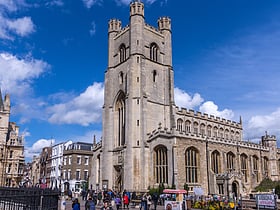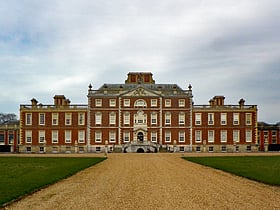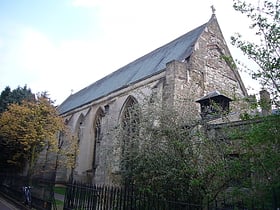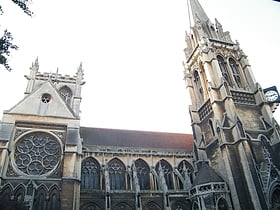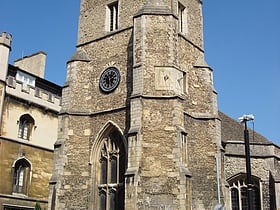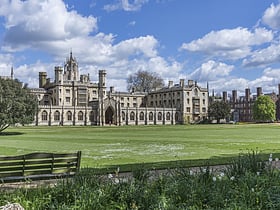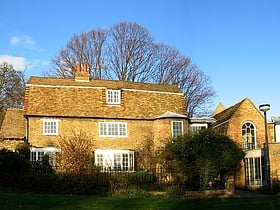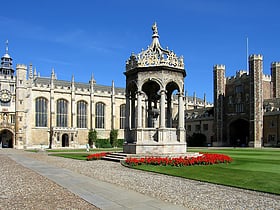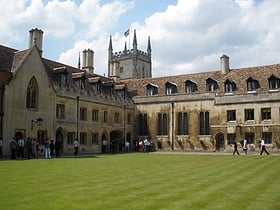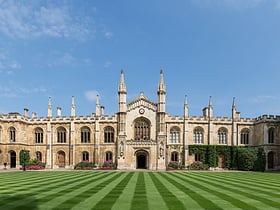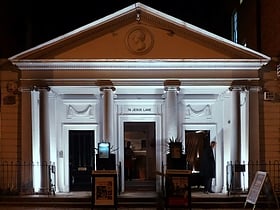Cambridge: Historical Place
Places and attractions in the Historical place category
Categories
- Universities and schools
- Historical place
- Church
- Park
- Shopping
- Museum
- Bridge
- Gothic Revival architecture
- Sacred and religious sites
- Nightlife
- Street
- Shopping district
- Science museum
- Specialty museum
- Concerts and shows
- Art museum
- Library
- History museum
- Theater
- Cemetery
- Sport
- Sport venue
- Monastery
Church of St Mary the Great
The Church of St Mary the Great, also known as Great St Mary's, is a historical and architectural gem nestled in the heart of Cambridge, United Kingdom. This venerable church serves not only as a place of worship but also as a significant landmark in the city's skyline.
Wimpole Estate
Nestled in the heart of the Cambridgeshire countryside, Wimpole Estate is a remarkable testament to England's rich historical tapestry. This grand estate, managed by the National Trust, encompasses a majestic mansion, a working farm, and a sprawling parkland, offering...
Little St Mary's
Nestled in the heart of Cambridge, Little St Mary's is a haven of tranquility and spiritual heritage. This Anglican church, officially known as St Mary the Less, stands proudly as a testament to medieval architecture and religious devotion.
Our Lady and the English Martyrs Church
Our Lady and the English Martyrs (OLEM) Church stands as a prominent landmark in the city of Cambridge, United Kingdom. This Catholic church, with its striking Gothic Revival architecture, commands attention and serves as a spiritual hub for the local community...
St Botolph's Church
Nestled in the heart of Cambridge, St Botolph's Church stands as a serene sanctuary of spirituality and history. This Anglican church, dedicated to St Botolph, who is the patron saint of travelers, has been serving the faithful and the community for centuries.
St John's College
St John's College is a constituent college of the University of Cambridge founded by the Tudor matriarch Lady Margaret Beaufort. In constitutional terms, the college is a charitable corporation established by a charter dated 9 April 1511.
St Andrew the Great
St Andrew the Great is a Church of England parish church in central Cambridge. Rebuilt in late Gothic style in 1843, it is a Grade II listed building. The church has a conservative evangelical tradition and participates in the Anglican Reform movement. The congregation includes Cambridge residents, overseas visitors and students.
Kettle's Yard
Kettle's Yard is an art gallery and house in Cambridge, England. The director of the art gallery is Andrew Nairne. Both the house and gallery reopened in February 2018 after an expansion of the facilities.
Trinity College
Trinity College is a constituent college of the University of Cambridge. The college was founded in 1546 by King Henry VIII. Trinity is one of the oldest and largest colleges in Cambridge, with the largest financial endowment of any college at either Cambridge or Oxford.
St Bene't's Church
St Bene't's is a Church of England parish church in central Cambridge, England. Parts of the church, most notably the tower, are Anglo-Saxon, and it is the oldest church in Cambridgeshire as well as the oldest building in Cambridge.
Pembroke College
Pembroke College is a constituent college of the University of Cambridge, England. The college is the third-oldest college of the university and has over 700 students and fellows.
Corpus Christi College
Corpus Christi College, is a constituent college of the University of Cambridge. From the late 14th century through to the early 19th century it was also commonly known as St Benet's College.
St Catharine's College
St Catharine's College is a constituent college of the University of Cambridge. Founded in 1473 as Katharine Hall, it adopted its current name in 1860. The college is nicknamed "Catz".
Peterhouse
Peterhouse is the oldest constituent college of the University of Cambridge in England, founded in 1284 by Hugh de Balsham, Bishop of Ely. Today, Peterhouse has 254 undergraduates, 116 full-time graduate students and 54 fellows.
Homerton College
Homerton College is a constituent college of the University of Cambridge. Its first premises were acquired in Homerton, London in 1768, by an informal gathering of Protestant dissenters with origins in the seventeenth century. In 1894, the college moved from Homerton High Street, Hackney, London, to Cambridge.
Selwyn College
Selwyn College, Cambridge is a constituent college of the University of Cambridge. The college was founded in 1882 by the Selwyn Memorial Committee in memory of George Augustus Selwyn, the first Bishop of New Zealand, and subsequently Bishop of Lichfield.
Queens' College
Queens' College is a constituent college of the University of Cambridge. Queens' is one of the oldest colleges of the university, founded in 1448 by Margaret of Anjou, and has some of the most iconic and recognisable buildings in Cambridge.
Jesus College
Jesus Lane is a street in central Cambridge, England. The street links with the junction of Bridge Street and Sidney Street to the west. To the east is a roundabout. To the south is King Street, running parallel with Jesus Lane and linking at the roundabout.
Christ's College
Christ's College is a constituent college of the University of Cambridge. The college includes the Master, the Fellows of the College, and about 450 undergraduate and 170 graduate students.
Gonville & Caius College
Gonville & Caius College is a constituent college of the University of Cambridge in Cambridge, England. Originally founded in 1348, it is the fourth-oldest of the thirty-one colleges at the University of Cambridge and one of the wealthiest.
Emmanuel College
Emmanuel College is a constituent college of the University of Cambridge. The college was founded in 1584 by Sir Walter Mildmay, Chancellor of the Exchequer to Elizabeth I. The site on which the college sits was once a priory for Dominican monks, and the College Hall is built on the foundations of the monastery's nave.
Magdalene College
Magdalene College is a constituent college of the University of Cambridge. The college was founded in 1428 as a Benedictine hostel, in time coming to be known as Buckingham College, before being refounded in 1542 as the College of St Mary Magdalene.
Girton College
Girton College is one of the 31 constituent colleges of the University of Cambridge. The college was established in 1869 by Emily Davies and Barbara Bodichon as the first women's college in Cambridge. In 1948, it was granted full college status by the university, marking the official admittance of women to the university.
Fitzwilliam College
Fitzwilliam College is a constituent college of the University of Cambridge. The college traces its origins back to 1869 and the foundation of the Non-Collegiate Students Board, a venture intended to offer academically excellent students of all backgrounds a chance to study at the university.
Hughes Hall
Hughes Hall is a constituent college of the University of Cambridge in England. It is the oldest of the University of Cambridge's postgraduate colleges. The college also admits undergraduates, though undergraduates admitted by the college must be aged 21 or over. There is no age requirement for postgraduate students.
St Edmund's College
St Edmund's College is a constituent college of the University of Cambridge in England. Founded in 1896, it is the second-oldest of the four Cambridge colleges oriented to mature students, which accept only students reading for postgraduate degrees or for undergraduate degrees if aged 21 years or older.
Map

